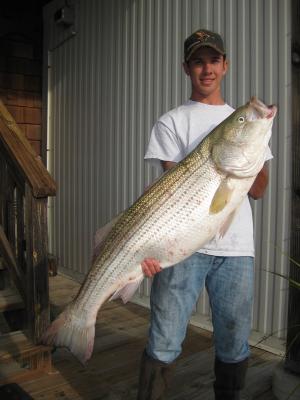Mid-Atlantic Regional Planning Body holds forum
The first big rockfish of the fall season were caught Tuesday by anglers trolling plugs at Overfalls Shoal. These were 30-pound class fish, and they were eating bunker and flounder. With the fall run officially underway, all we need is some reasonably decent weather and the fleet will be on the grounds.
Tog fishing picked up a bit Wednesday with both private and charter boats finding fish at the Outer Wall and Ice Breakers. This action will improve if the wind ever gives the water a chance to clear.
Mid-Atlantic Regional Planning Body holds forum in Lewes
The Mid-Atlantic Regional Planning Body held a public forum Wednesday, Nov. 5, at the University of Delaware Virden Center. The objective of the forum is to gather input from a wide range of people with an interest in how the ocean is managed. Comments were supposed to be directed toward the interim plan as outlined by the staff and in literature available at the meeting. Unfortunately, several of those who spoke had their own agenda and had nothing to add to the discussion of the interim plan or in some cases nothing to do with ocean planning at all.
This plan is the direct result of an executive order given by President Obama in an effort to make ocean management easier and more productive. Once the plan is completed, it should be easier for people to look at current uses of the ocean and then know where and how to best plan new projects, such as wind farms and oil or gas exploration.
One of the first problems I noticed was that fishing was a single category in the draft document. I suggested that fishing should be two categories, recreational and commercial. While both groups share some common interests, there are many differences in how we use the ocean.
Morgan Gopnik, an environmental policy consultant from Washington, D.C., said the effect on local communities should be considered in any decision-making process. These communities live or die by what happens out in the ocean, including lack of fishing access, oil exploration or an oil spill from a tanker.
Bob Thornton, representing a home building association, was concerned that decisions made on ocean uses could affect the availability of oceanside home building lots. This might include a large buffer along the oceanfront where homes could not be built.
Suzanne Thurman from the Marine Education, Research and Rehabilitation Institute was concerned about the safety of marine mammals and turtles. She claimed there were data gaps on turtles that should be filled. She felt that marine animals were stakeholders as well as people.
Regan Nelson, a paid consultant with the Natural Resources Defense Council, was concerned about ecosystem protection associated with any use of the ocean. Ecosystems must be considered when plans are being developed for such things as oil and natural gas drilling or dredging.
Greg Rosner, a member of MERR and the Surfrider Foundation, said changes in the beach due to replenishment have left only one place in Delaware to surf. He is concerned that recreational uses of the ocean are not considered when plans are made for large projects. Now he and his friends have to leave the state if they want to surf. This has removed many dollars from the Delaware economy.
He is also concerned that threatened species and habitat do not get the attention they deserve when projects are proposed, and these factors must be considered when any ocean-use plans are developed. He noted the absence of the Army Corps of Engineers from the discussion.
Jeff Deem, a member of the Mid-Atlantic Fishery Management Council from Virginia, spoke to the critical importance of both recreational and commercial fishing to the Mid-Atlantic region. He said the ocean is going to change, and conflicts will arise as wind farms, oil and gas rigs, and LNG facilities are built. He is fighting to make sure fishing will be allowed close to any structure built in the ocean and that any proposed project will not destroy valuable marine habitat.
Bill Baker from Bill’s Sport Shop said any inclusion of Marine Protected Areas would be a death knell for recreational fishing. MPAs in California have devastated the fishing there, and they have no place in the Mid-Atlantic region.
Bill was also concerned that the Inland Bays had not been considered in the planning process. He was assured that efforts had been made to gather input from groups concerned with these areas.
I realize that this is a very complex situation and we only have until Nov. 20 to send in comments on the draft. You can find out more about the Mid-Atlantic Regional Planning Body Interim Plan at www.boem.gov/MidA-RPB-Meetings. Comments should be sent to MidAtlanticRPB@boem.gov.



















































